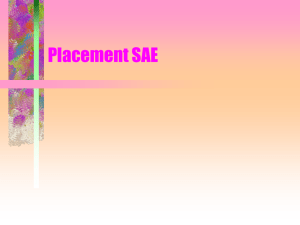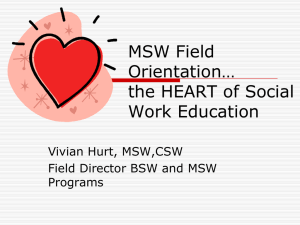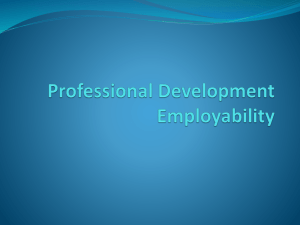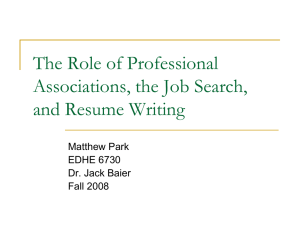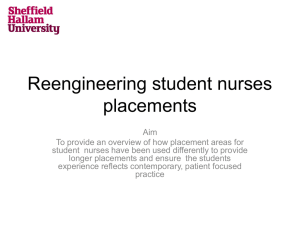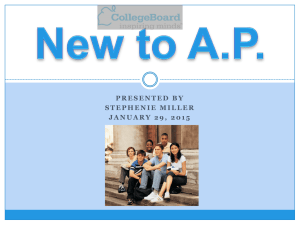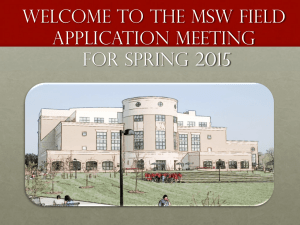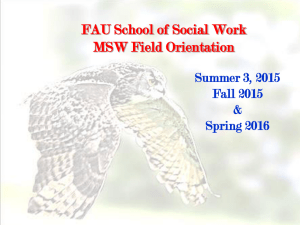Field Orientation Presentation 2015
advertisement
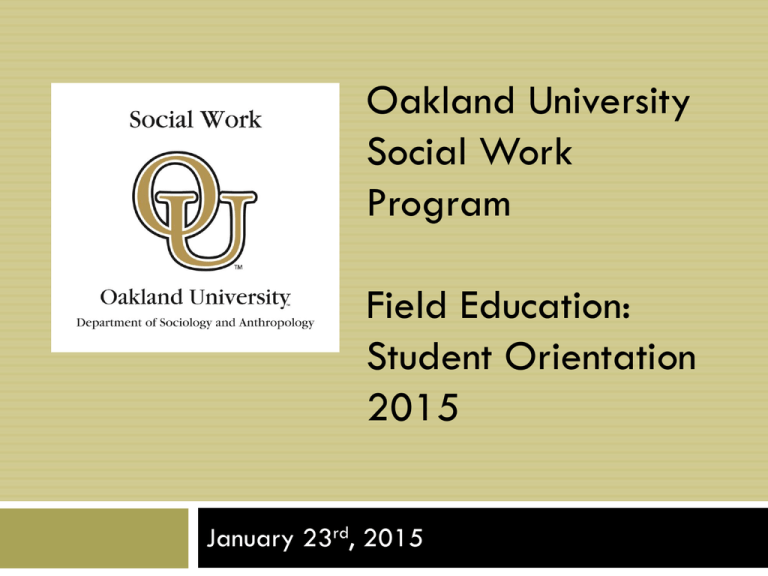
Oakland University Social Work Program Field Education: Student Orientation 2015 January 23rd, 2015 Purpose of Field Education • • Field is the heart of social work Students will develop: – – – – Professional identity Self-understanding Integration of theory and practice Skills toward competent practice Core Competencies for Field Education Professionalism Ethical Responsibility Critical Thinking Diversity Social Justice Research Person In Environment Policy Practice Leadership Service Delivery Self-Care Oakland University Field Program Your field experience will be a team approach made up of the Field Director, Field Liaison, Field Instructor, and most importantly, you!! Communication is an integral part of the success of field A willingness to learn new skills, have an open mind, and an overall positive approach toward all learning opportunities is critical to your success and happiness in the field program. Student Responsibilities Attending the Student Orientation to Field Practicum Check your Oakland University email daily Completing all necessary paperwork and applications necessary for proceeding into and continuing in field practicum Notifying the Field Director when placement site has been confirmed Becoming familiar with your field manual Represent Oakland University and yourself in the most professional manner at all times Do not share any information regarding your internship on your social media outlets. Field Education Process December January 1. Pre-screen Application to determine eligibility 2. Participation Field Orientation and completion of the formal Field Application March 3. Notified of assigned placement The Field Education Director is responsible for all placement assignments Overview of Placement Process Within 48-72 hours of notification, the students will contact the agency to set up an interview If you contact for an interview and have to leave a message, please give them a few days to respond before calling again. Student will prepare for interview by reviewing agency/program website to understand populations served, mission and other pertinent information. Student may utilize Career Services prior to interview to practice and seek interview pointers. At the conclusion of the interview, the student will contact their social work advisor to provide information about interview outcome. Students that are completing a minor in Child Welfare For those students that are completing a Minor in Child Welfare, it is important to note on your field application if you have interest in pursuing your endorsement application to the State of Michigan following graduation. The endorsement is separate from the minor and would benefit those students that want to work at the Bachelor level for Child Protective Services or at a DHS contracted Child Welfare Agency. Interviews – What do they look for? Flexibility • Ability to take constructive feedback • Ability to respond to the “environment” • Commitment to the profession • Commitment to being a professional • Self-Starter • Desire to learn • Positive attitude • Important Information to clarify during interview Start date. Hours and dress code Complete form for the agency file, If not help get them completed. Who does the student go to when you are not available? What are your expectations for the students. Students cannot use their vehicle to transport clients Field Structure 400 Level Classes Fall 2015 *you may have other required classes in Winter 2016 *you may have other required classes in addition to the below list addition to the below list Students need to be enrolled in: SW 405 SW 430-this is your internship SW 431- field seminar *needs to be same instructor for 430/431/432/433 Students need to be enrolled in: SW 406 SW 432-this is your internship SW 433- field seminar *needs to be same instructor for 430/431/ 432/433 Learning Process Learning take time…………………………… 1 4 8 Weeks 10 Evaluation and Grading • • • Semester evaluation based on learning agreement (signatures, date, grade, number of hours), attendance and participation in liaison group seminars, and input from field instructor and liaison Grading for SW 431/433 is a satisfactory/unsatisfactory Liaison reviews then recommends and submits grading report form to the Field Director Struggles in the field I am concerned I am not learning enough I do not understand why I am doing ________ My internship is not clinical enough My supervisor is too busy for supervision I do not know what I should be doing I am sick and will not be able to show up I have too much going on with school and work therefore it is okay if I miss my internship for the week My friend is doing___ in her internship and I am not Addressing Concerns in Field Frequently Asked Questions Q: How many field placement hours are needed to receive a BSW A: The Council on Social Work Education (CSWE) establishes the minimum standard for the number of hours required to complete the B.S.W. is 400 hours in most cases, 2 full days a week beginning in September and concluding in mid April Q: Do I find my own placement? A: No. The Field Education Director is responsible for assigning you to a field placement. Our field education program has long-standing relationships with social work agencies and is responsible for developing all placement sites. Field education staff maintains regular contact with field agencies regarding student placements. If you want to be placed at a specific agency, submit your request in writing to the field coordinator. The program will then contact the agency to explore the feasibility of developing this placement. Q: Can I be paid for my field placement? A: In the past, there are a few competitive stipend internships available. However, there are no “paid” internships at this time Frequently Asked Questions Q: Do I get a new placement each semester? A: No. Students stay in at the same agency for both semesters Q: Can I interview at several agencies before selecting my placement? A: No. The Field Education Director will work with you to arrange an interview for a field placement at an agency that meets your learning needs. If the interview goes well and you and the agency agree that the placement is an appropriate fit, it will be confirmed. If either party has reservations, another interview will be arranged. Q: Do I need a criminal background check? A: For many placements, a criminal background check is required. Fingerprinting, a physical, PPD (tuberculosis test) and other health requirements may also be required. When possible, you will be notified about these requirements in advance, should it be a requirement of the agency. Frequently Asked Questions Q: What if I am sick and miss several days of field? A: Any hours missed must be made up. Q: Do field placement hours count toward licensure? A: No. Hours that count toward licensure must be completed after receiving your BSW Q: Is field instruction a graded course? A: Yes, students receive a satisfactory or unsatisfactory. If students received unsatisfactory they cannot continue on to the next semester. Student will be asked to sit out a year and retake the first semester of required field courses Q: How far will I have to travel for my field placement? A: Students are expected to allow approximately 45 minutes to an hour of travel time to and from their field placement site. This may include traffic. Every effort will be made to plan a reasonable commute. Frequently Asked Questions Q: Are there any evening or weekend placements available? A: Evening and/or weekend placements are limited, as many agencies are either closed or do not have available supervision or suitable assignments during these hours. Typical placement days are Monday through Friday and take place during standard business hours. Q: What if I do not like my placement? A: We encourage every student to enter field with an open mind. If there is a significant conflict between the student and agency, the field education director will assess the situation based on the level of intervention and move forward accordingly. Q: Can I drive my clients around? A: No. We do not permit students to drive clients in their personal vehicle. This is an Oakland University Policy. Students may use an agency vehicle to transport clients. Any Questions? Questions? Stephanie Brandimarte,LMSW brandima@oakland.edu 248-370-2502 Heather El-Khoury,LMSW elkhoury@oakland.edu 248-370-3914
